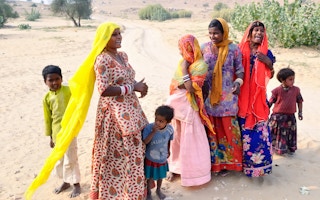In the Indian community of Mahewa, when monsoon floods come, women start to eat and drink as little as possible.
But the change has nothing to do with the availability of clean water and food. Instead, it’s about minimising visits to the toilet at a time when floods make the trip harder and riskier, according to Virginie Le Masson, a researcher at the London-based Overseas Development Institute.
Such realities are a reason why women’s views are crucial to developing policies that actually work to reduce disaster risks and deal with climate change, she said at the launch this week of a report on gender equality and climate goals.
Bringing women into decision-making in places like Gorakhpur district in India’s Uttar Pradesh state - where Mahewa is located - is often perceived as slowing down processes and making them more politically complicated, she said.
Organisations carrying out development projects in India sometimes see efforts to include women as something that “creates chaos (and) disturbs the peace in the family”, said Reetu Sogani, an Indian researcher on traditional knowledge, gender and climate change who helped lead the work in Gorakhpur.
Even women share that view sometimes. “What is the need for women to step out and participate when men are there?” some participants in a Gorakhpur focus group told researchers.
In fact, participants in the project estimated that without women’s involvement, only 10 to 20 per cent of what was actually achieved would have happened, she said.
“It is largely because of women that the project has been sustainable so far, as well as effective in resilience building,” the report said.
Ensuring women are involved in efforts to adapt to climate change and reduce disaster risks will be critical as the world ramps up funding to a promised $100 billion a year from 2020 to help poor countries adapt to climate change impacts such as floods and droughts and to adopt cleaner energy, experts say.
“
Solidarity matters for resilience, and extreme inequality undermines that, whether gender or otherwise.
Andrew Norton, director, International Institute for Environment and Development
“If we miss this, are we going to perpetuate the status quo, where women can’t access toilets or do the kinds of things they need to do?” asked Sam Bickersteth, head of the Climate and Development Knowledge Network, one of the backers of the new report based on case studies from India, Kenya and Peru.
Moving to cities
But when women were included in planning projects - like one in Gorakhpur to combat flood risks through things like better drainage, smarter agriculture and safer buildings - much more got done and the changes lasted longer, Sogani said.
Particular attention should be paid to women’s involvement in climate change adaptation efforts in the world’s burgeoning cities, as migration brings greater numbers of struggling rural families to urban areas, Bickersteth and others said.
In some ways, a move to the city can offer new opportunities for women, from a greater choice of jobs to easier access to public transport, healthcare, policing and schools, said Andrew Norton, director of the London-based International Institute for Environment and Development.
But women also face new pressures, including an inability to grow their own food, which can weaken food security, Le Masson said.
Women who at home might have had a say in things like wood and water collection and farming may end up participating less in decision-making in cities, Songani said.
Ensuring women have a real voice in efforts to adapt to climate change in their communities, and benefit from them, will take hard work, the researchers said.
“Just inviting women to meetings or supporting them to make more money will not make transformative changes,” Le Masson said.
In Kenya, for instance, women struggle to start businesses because they rarely own land, and so have no collateral to get loans.
Creating durable shifts that enable women to adapt equally will require everything from getting supportive men to start conversations about why women should have a share of power to ensuring donors fund projects for longer periods, she said.
If these things don’t happen, efforts to build genuine resilience to growing climate pressures are unlikely to succeed, the experts said.
“Solidarity matters for resilience, and extreme inequality undermines that, whether gender or otherwise,” Norton said.
This story is republished with permission from Thomson Reuters Foundation, the charitable arm of Thomson Reuters, that covers humanitarian news, climate change, women’s rights, trafficking and property rights. Visit http://news.trust.org/climate)










